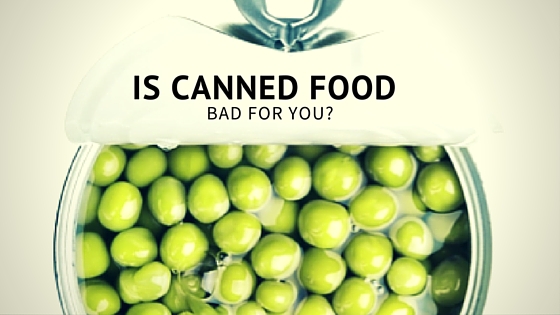We live in a time when people can’t stop singing the praises of fresh produce and locally sourced foods. And don’t get us wrong – we love fresh produce and local farms just as much as the next person, but what about food that isn’t fresh out of the ground? Is it really all that bad? Given the opinions of a lot of people, you’d think that canned food was one of the worst things you could put in your body. So we decided to check it out for ourselves and really dig in to find out if canned food really is bad for you.
The Canned Food Process
To understand how healthy foods that are canned are, we first need to understand the process behind canning foods. Canning is a process of preserving food by sealing it by putting it into an airtight can. The best part is that removing the air from the container means that little or no chemical preservatives are required to keep food safe and edible for a longer period of time. Instead, they use high temperatures to kill off bacteria either through steaming the canned contents under pressure or soaking them in a bath of boiling water before they’re put into airtight containers.
Downsides of Canned Food
While some people always prefer fresh food, there will always be a use for canned food. Because canning preserves food for long periods of time (generally up to a year or more), it’s useful for feeding large groups of people and shipping food long distances. There’s also the cost. Canned food is mass produced and those economies of scale drive down the cost. This makes canned food a good option for people who can’t afford or don’t have access to fresh food.
But there are still some downsides to eating canned food. Canned food contains trace amounts of a chemical substance called Bisphenol A (or BPA), which is used to keep the metals in the can from touching the food inside. In rare cases, the BPA chemical can merge with the food and if ingested in high enough doses can potentially cause cancer or other disorders. However, the FDA, the NIH, and many other health and food organizations around the world have studied the potential dangers of BPA and found that the levels needed to cause harm are far higher than the average consumer would ever ingest – upwards of a few hundred cans of food in a day. But that still doesn’t tell us much about the nutritional content of canned food.
Can Canned Food Be Good For You?
Now that we’ve talked about the minimal potential harms that come with the process of canning food, we can focus on what that same process does to the actual food. Does it make it more or less healthy? And the answer is a little bit of both. Because the canning process uses heat to preserve the food, different nutritional compounds are affected in different ways. For instance, antioxidants in carrots are released and modified when heating to allow them to more effectively be absorbed into our bodies, giving canned carrots more antioxidant power than fresh carrots.
On the other hand, some nutrient value is lost during the heating process. For instance, canned corn’s vitamin C count is reduced during the canning process, so that nutritional value is lost. However, the overall nutritional content isn’t significantly modified or reduced during canning, and the cost benefits, as well as the longevity of canned food makes up for it.
So what do we think? It’s never a bad idea to have a few cans of vegetables lying around, especially corn, carrots, and beans. Eat fresh produce when you can, but don’t feel bad about popping open a can of black beans or stewed tomatoes once in a while. What do you think? Do you always keep a cabinet full of canned food, or do you prefer to only eat fresh? Share your opinion with us in the comments!






all canned foods are not bat. The worse part of them is the salt content that’s used to preserve them and make them more appetizing. I grew up on canned food they can make mealtime faster and easier sometimes. Just remember to rinse to remove most of the salt. Can’t always have fresh or frozen but can always have a variety of canned. I keep a good supply always.
Thanks for this, I have been living without canned food for some time, cooking beans in a slow cooker and either freezing them or dehydrating them, but I really miss canned tomatoes for a quick pot of chili. I’ll still opt for non-canned foods but lighten up a bit too! Thanks again!
Our pleasure Susan! Thanks for stopping by! Let us know how else we can help!